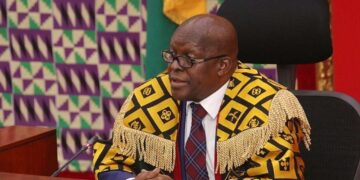The Speaker of Parliament, Alban Sumana Kingsford Bagbin, has called for a comprehensive review of Ghana’s 1992 Constitution, arguing that it no longer serves the nation’s developmental needs.
Speaking at the University of Ghana Alumni Lecture on the theme “30 Years of Parliamentary Democracy: The Journey Thus Far,” Bagbin highlighted the constitution’s many flaws, emphasizing that while it has ensured political stability, it has also created governance challenges.
He pointed out that the excessive concentration of power in the executive branch has undermined democratic balance and affected national progress.
“I must admit we have succeeded in achieving political stability at the expense of development,” Bagbin remarked, adding that the need for constitutional transformation is long overdue.
Bagbin expressed concerns over the growing disillusionment among the youth toward democracy, citing the findings of the 2024 Afrobarometer report, which revealed widespread dissatisfaction.
According to the Speaker, this disillusionment poses a serious threat to Ghana’s democratic future, as the youth increasingly question the effectiveness of the current system.
He explained that the flaws within the constitution, including unchecked executive power, have eroded public trust in democratic institutions and hindered the ability of Parliament to function effectively.
“We now have to move on to focus on development,” he said, urging for meaningful reforms that address these imbalances.
The Speaker’s call for constitutional reform comes at a critical time when discussions on reshaping Ghana’s democratic framework are gaining momentum.
Bagbin stressed the need for all stakeholders to engage in a national dialogue that reflects the aspirations of the people, particularly the youth.
“I agree with Ghanaians who say there is nothing to reform—we have to transform everything,” he declared, stressing that a more balanced distribution of power is essential for fostering an equitable and effective government.
By addressing these constitutional defects, Bagbin hopes to chart a new course for Ghana’s democratic and developmental future.

































